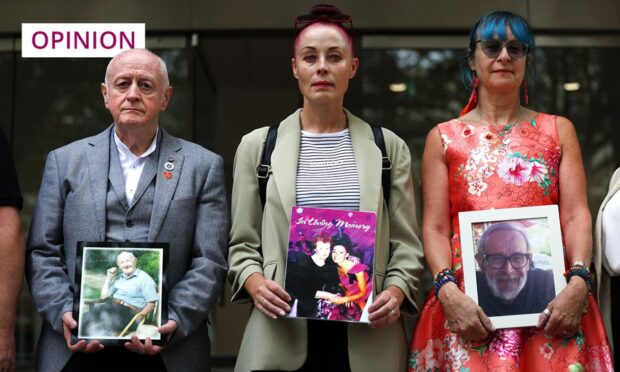It’s 1978. Maryburgh Primary School has reached the final of the Northern Constabulary Inter-School Quiz.
I’m the only girl in our team of four, and I’m wearing a brand new rig-out, bought specially for the occasion by my Granny Munro. Like the old lady herself, the flounced blue skirt and 1970s-collar blouse made me feel special.
The question master, a police sergeant, I think, turned to me. “Your question, Erica. What part of the body does an ophthalmologist treat?”
Ach, darnit, I had no idea. Disconnected body parts spun around my 11-year-old brain. Feet? Lungs? I looked skywards, but God had nothing. Or did He? Because, gazing in panic round the large audience, I was perplexed to notice my elderly, churchgoing great auntie in the back row, rubbing her eyes expansively with both hands, as though trying to stay awake. Well, sorry, auntie, am I boring you?
“Stomach?” I guessed, wrongly, into the microphone.
We lost the quiz. Well done Tarradale Primary; I doubt I congratulated you at the time. It took me ages to twig what my auntie had been up to, but when I did, years after she died, I burst into tears.
The covid inquiry this week has confirmed what we always knew: disabled and older people’s lives were seen by ministers as disposable. https://t.co/uvR4oSEgmQ pic.twitter.com/TWQLSIvaCr
— Frances Ryan (@DrFrancesRyan) November 3, 2023
Yesterday, in Glasgow’s Braehead shopping centre, I held the lift doors for an old lady who hirpled towards me, on two sticks. “I don’t move as fast as I used to,” she puffed as she got in. Then, as the doors closed, she sighed and added: “Don’t get old.”
“Aw, don’t say that,” was all I could find to reply before we reached the ground floor and parted with smiles.
Well, if she’d been watching the news lately, she probably put those two sticks through her TV screen, as the Covid inquiry uncovered grisly details of a mindset within the UK Government which, in a crowded field of cold-hearted ineptitude, revealed the most callous soundbite yet.
“Covid is nature’s way of dealing with old people.”
Springing from the very bowels of power, this was the notion espoused behind closed doors by our most senior elected representatives as they tried, too late and not very hard, it seems, to get a grip on the catastrophically escalating pandemic.
We don’t ‘deal with’ elderly people
The cunning plan was that old people, with their demonstrably higher Covid mortality rates, should fatalistically accept that Mother Nature was having a bit of a clear-out and embrace “their” fate without putting the rest of “us” out too much. “We” could, thus, could stop faffing around with lockdowns, shielding and isolating, get back to work and get the dismal economy hobbling back on track.
What a win for capitalism. After all, these billionaire commercial property owners aren’t going to get their office rental income if nobody’s inside them, are they?
“Dealing with”. Criminals are dealt with by courts. Mould dealt with using bleach. A rash dealt with by ointment. A riot dealt with by police. A problem solved by the good guys.
Sorry, David Attenborough, Judi Dench, Helen Mirren, David Hockney, Alan Bennett, Billy Connolly, but it’s officially fine and not even our fault if you die from Covid.
Sorry? Not those old people, prime minister? Well, who then? People in care homes? People like my unexpectedly mischievous great auntie? Please, do, give us a list. You’ve clearly thought the unthinkable, so you might as well say the unsayable. Go on, we’re all agog.
Our nearest and dearest are not expendable
It’s called othering. Deciding that an entire sector of our shared society is both different and expendable. It’s bad enough when viewed in the murkier armpits of social media, but to learn so bluntly that our politicians entertained the notion out loud, for even a moment, is beyond the pale.
Our old people brought us all up, worked hard, succeeded, failed, made do and mended, nurtured us, wiped our bums, cheered for us and loved us, just as their old people did for them, just as we will do in future.
Old, if you are not already old, is what you and I will be, if we are lucky. Old is the last bit of the book; as vital as the beginning or the middle.
When it comes to problems to be dealt with, these politicians are looking in the wrong places
Of course, there are useless people in the world, but I’m telling you now, when it comes to problems to be dealt with, these politicians are looking in the wrong places. Not in the homes of our elderly friends and families. Not in care homes, full of our dearest and most vulnerable. No, all some of them need is a mirror.
It might have been a better story if, at the Northern Constabulary Inter-School Quiz, I’d twigged what my sweet great auntie was up to and answered “eyes!” to the ophthalmologist question. And, no, we didn’t lose the quiz by just one agonising point; this isn’t Disney.
But, if we had won thanks to her sneaky subterfuge, I would have been too embarrassed to have thanked her afterwards. Now, though, heavens, when one day I meet her eye to eye, how we’ll laugh about it, high five, do a little dance of happy subversion. For she is me and I am her and she was me and I will be her and we are all the same.
Erica Munro is a novelist, playwright, screenwriter and freelance editor


Conversation